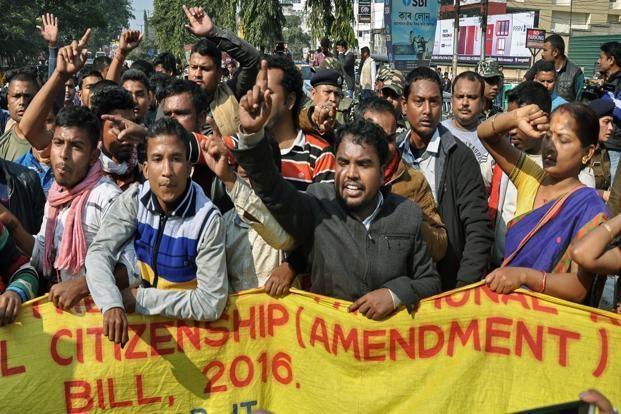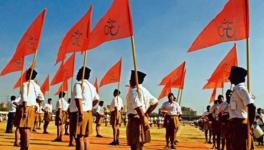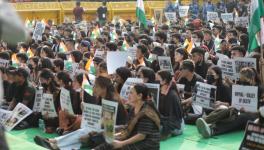Citizenship Bill: Why Protests Have Spread Across Northeast

Image Coutesy: DNA India
Ever since the idea of the Citizenship (Amendment) Bill was mooted in 2016, it had become evident that it would elicit strong reactions in Assam. Right from the introduction of the Bill in Lok Sabha on July 19, 2016, a movement started in Assam, particularly in the Brahmaputra valley, demanding its immediate withdrawal. All the political parties and mass organisations, except the ruling Bharatiya Janata Party (BJP), expressed their clear opposition to the Bill. Politically, BJP was completely isolated on the question of the Bill, where even its coalition partner, the Asom Gana Parishad (AGP), had outrightly rejected it.
When a Joint Parliamentary Committee (JPC ), formed to consider the Bill, visited Assam on May 7-9, 2018, almost all organisations, except the few run by BJP’s ideological parent, the Rashtriya Swayamsevak Sangh (RSS), gave representation to it, demanding the Bill’s withdrawal. This was supplemented by huge protests throughout the state. However, it is a fact that a large number of organisations that gave representations in Silchar of the Barak valley expressed their opinion in favour of the Bill. But any close observer of the developments in Assam can clearly see that as a whole, the state is overwhelmingly against the Bill.
When the JPC visited Shillong, the Meghalaya government, where BJP is a coalition partner, gave a representation urging the JPC to withdraw the Bill. Subsequently, several state governments in the Northeast clarified that they were not in support of the Bill. At the all-India level, the then partners of BJP- Shiv Sena, Telugu Desam Party and Janata Dal (United) also publicly expressed their opposition to the Bill.
Also Read: Is Assam being Polarised on the Citizenship Bill Issue?
But BJP, with its definite political and ideological goals, was unmoved. With an eye on the upcoming Lok Sabha elections, starting from December 31, 2018, within a week it bulldozed the entire Opposition and pushed the Bill in the Lok Sabha after using its brute majority in the JPC. The Lok Sabha passed it on January 8, 2019 by voice vote. But strategically, the government abstained from introducing the Bill in Rajya Sabha on January 9 where it doesn’t enjoy majority. Subsequently, BJP leader Vijay Goel, announced in Rajya Sabha that it will be passed in the Upper House in the coming Budget Session of Parliament.
To understand the reactions to the Bill a look at it is necessary:
The Citizenship (Amendment) Bill, 2016
A Bill further to amend the Citizenship Act, 1955
Be it enacted by Parliament in the Sixty-seventh year of the Republic of India as follows—
1. i. This Act may be called the Citizenship (Amendment) Act, 2016.
ii. It shall come into force on such date as the Central Government may, by notification in the official Gazette, appoint.
2. In the Citizenship Act, 1955 (hereinafter referred to as the principal Act), in Section 2 in sub-section (1) after clause (b), the following proviso shall be inserted, namely:-
“Provided that persons belonging to minority communities, namely, Hindus, Sikhs, Buddhists, Jains, Parsis and Christians from Afghanistan, Bangladesh and Pakistan, who have been exempted by the Central Government by or under clause (c) of Sub-section (2) of section 3 of the Passport (Entry into India) Act, 1920 or from the application of the provisions of the Foreigners Act, 1946 or any order made there under, shall not be treated as illegal migrants for the purposes of this Act.”
3. In the principal Act, in section 7D, after clause (d), the following clause shall be inserted, namely:-
“(da) the Overseas Citizen of India Cardholder has violated any of the provisions of this Act or provisions of any other law for the time being in force; or”
4.In the principal Act, in the Third Schedule, in clause (d), the following proviso shall be inserted, namely:-
‘Provided that for the persons belonging to minority communities, namely, Hindus, Sikhs, Buddhists, Jains, Parsis and Christians from Afghanistan, Bangladesh and Pakistan, the aggregate period of residence or service of a Government in India as required under this clause shall be read as “not less than six years” in place of “not less than eleven years”.’
Why Opposition to the Bill
A quick glance through the Bill is sufficient to understand that it is innately antithetical to the ethos of the Constitution, which, being intrinsically secular in its character, doesn’t allow anyone to consider the question of citizenship from the point of view of religion. Making a basic departure from the ethos of the Constitution, the Bill seeks to consider a certain class of illegal migrants fit for citizenship on the basis of their religious identity. All non-Muslim immigrants from Bangladesh, Pakistan and Afghanistan will be treated eligible for Indian citizenship once this Bill is passed by Parliament.
Also Read: Will Assam Burn While BJP Fiddles With the Citizenship Bill?
Second, it proposes to violate the provisions of the 1985 Assam Accord that set the time frame for detecting foreigners who have entered illegally and have been residing there. Those who are following the recent history of Assam know that during 1979-1985, there was a huge agitation in Assam for detection and deportation of illegal migrants who entered Assam from Bangladesh (erstwhile East Pakistan) after 1951. The Left forces, along with democratic sections of the state, opposed this demand and were of the firm opinion that the cut-off date for detecting foreigners should be March 24, 1971, as Bangladesh was established as an independent country in 1971. This followed massive attacks on the Leftists. The Communist Party India (Marxist) alone lost 48 comrades as a result.
Finally, the Assam Accord was signed on August 15, 1985, between the leadership of the Assam agitation, the representatives of the state government of Assam and the central government, whereby March 24, 1971, was agreed upon as the cut-off date. It was placed before Parliament on August 16, 1985. Based on this date, Parliament amended the Citizenship Act, 1955, and clause 6 (A) was inserted into it, which became effective from December 7, 1985. The clause states that all those who have entered Assam on or after January 1, 1966, from the specific territory (i.e. East Pakistan now Bangladesh) before March 25, 1971, and ordinarily have been residents of Assam will be given Indian citizenship with certain conditions. By the proposed enactment of the Citizenship Bill, 2016, the provisions of the Assam Accord and the Citizenship Act, 1955, will be brazenly violated.
Third, the Bill, if passed, will render the exercise of updating of the National Register of Citizens (NRC) meaningless. Assam is the only state in the country to have an NRC which was prepared in 1951 on the basis of the first census data of independent India. It is now being updated under the supervision and direction of the Supreme Court. Democratic and secular forces are supporting this tedious exercise mainly on two counts—(i) NRC, if updated on the basis of March 24, 1971 as the cut-off date, will allay the apprehensions of the Assamese and tribal people about the ‘unchecked’ infiltration across the border, (ii) the religious and linguistic minorities will be protected from harassment and humiliations by stamping them as ‘Bangladeshis’, if all Indians are included in the updated NRC. But by passing the Bill, the BJP government is seeking to make this rigorous exercise futile.
Fourth, the Bill will definitely encourage infiltration across the border, which may have a serious impact on the socio-cultural, demographic and political fields of Assam and other states of the North East.
Ramifications
Assam has been burning after the BJP-led government at the Centre and the state decided to pass the Citizenship Bill. People from all walks of society are on the streets. BJP has been further isolated politically, as the AGP, has severed ties from the alliance. The protests have now spread to all the states of the Northeast.
Also Read: The Citizenship Bill and the Resurgence of the Rising Sun
The Bill is a well-planned strategy by BJP to legalise the concept of a Hindu Rashtra, where there will be discrimination against Muslims even on the question of citizenship. It may have far-reaching consequences in entire eastern India which seeks to erode the very basis of unity centering around language of different nations and nationalities and replace it by so-called cultural unity based on religion.
There is no doubt that this Bill, if enacted, will seriously damage unity, peace and tranquillity in the Northeast, undermining the secular democratic structure of the country. Even the leaders of religious minorities in Bangladesh are concerned that the Bill may provoke fresh attacks on the rights of minorities there and result in strained relations between India and Bangladesh.
The writer is a member of the Communist Party of India (Marxist) and the Left Democratic Mancha, a platform of 10 political parties in Assam. The views expressed are personal.
Get the latest reports & analysis with people's perspective on Protests, movements & deep analytical videos, discussions of the current affairs in your Telegram app. Subscribe to NewsClick's Telegram channel & get Real-Time updates on stories, as they get published on our website.
























